初中英语情态动词表推测练习题
- 格式:doc
- 大小:33.00 KB
- 文档页数:1
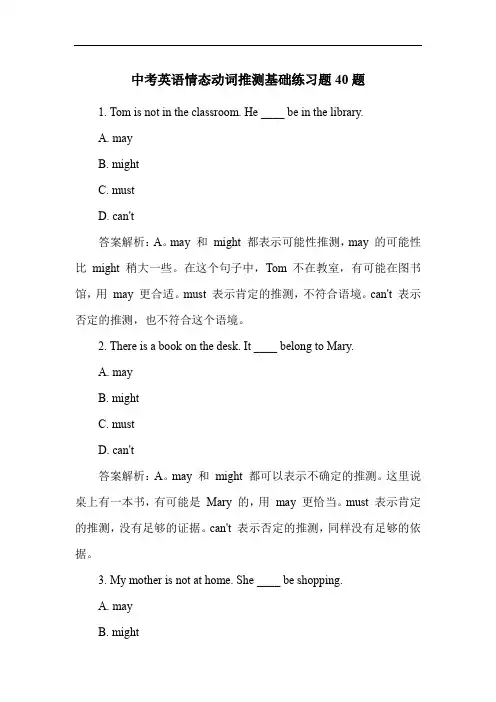
中考英语情态动词推测基础练习题40题1. Tom is not in the classroom. He ____ be in the library.A. mayB. mightC. mustD. can't答案解析:A。
may 和might 都表示可能性推测,may 的可能性比might 稍大一些。
在这个句子中,Tom 不在教室,有可能在图书馆,用may 更合适。
must 表示肯定的推测,不符合语境。
can't 表示否定的推测,也不符合这个语境。
2. There is a book on the desk. It ____ belong to Mary.A. mayB. mightC. mustD. can't答案解析:A。
may 和might 都可以表示不确定的推测。
这里说桌上有一本书,有可能是Mary 的,用may 更恰当。
must 表示肯定的推测,没有足够的证据。
can't 表示否定的推测,同样没有足够的依据。
3. My mother is not at home. She ____ be shopping.A. mayB. mightD. can't答案解析:A。
表示推测妈妈不在家可能去购物了,may 比might 可能性稍大一点,这里用may 更合适。
must 太肯定,can't 不符合妈妈不在家可能去购物的推测。
4. The boy looks happy. He ____ have got good grades.A. mayB. mightC. mustD. can't答案解析:A。
推测男孩看起来开心可能是得了好成绩,may 更符合。
must 太绝对,might 可能性又稍小,can't 与开心的样子不符。
5. I can't find my pen. It ____ be in my bag.A. mayB. mightC. mustD. can't答案解析:A。
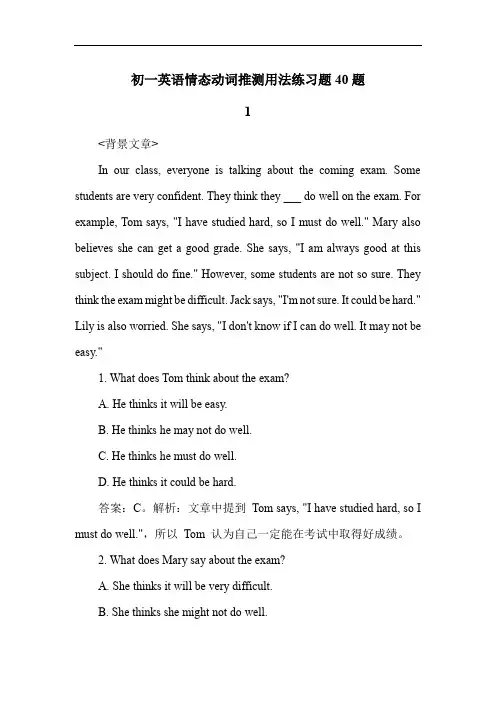
初一英语情态动词推测用法练习题40题1<背景文章>In our class, everyone is talking about the coming exam. Some students are very confident. They think they ___ do well on the exam. For example, Tom says, "I have studied hard, so I must do well." Mary also believes she can get a good grade. She says, "I am always good at this subject. I should do fine." However, some students are not so sure. They think the exam might be difficult. Jack says, "I'm not sure. It could be hard." Lily is also worried. She says, "I don't know if I can do well. It may not be easy."1. What does Tom think about the exam?A. He thinks it will be easy.B. He thinks he may not do well.C. He thinks he must do well.D. He thinks it could be hard.答案:C。
解析:文章中提到Tom says, "I have studied hard, so I must do well.",所以Tom 认为自己一定能在考试中取得好成绩。
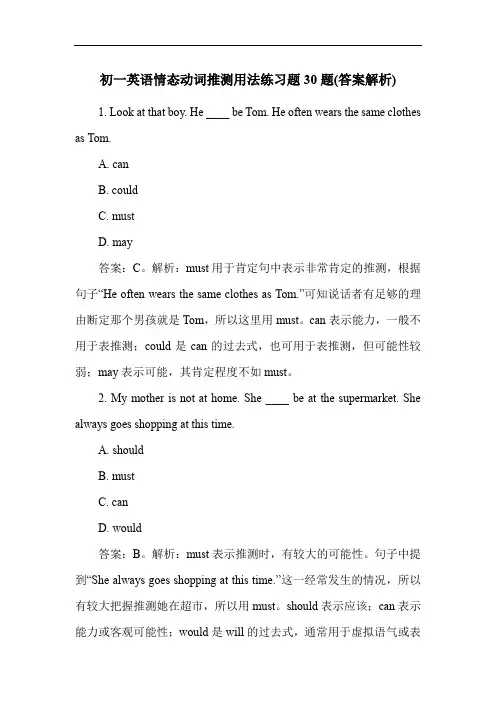
初一英语情态动词推测用法练习题30题(答案解析)1. Look at that boy. He ____ be Tom. He often wears the same clothes as Tom.A. canB. couldC. mustD. may答案:C。
解析:must用于肯定句中表示非常肯定的推测,根据句子“He often wears the same clothes as Tom.”可知说话者有足够的理由断定那个男孩就是Tom,所以这里用must。
can表示能力,一般不用于表推测;could是can的过去式,也可用于表推测,但可能性较弱;may表示可能,其肯定程度不如must。
2. My mother is not at home. She ____ be at the supermarket. She always goes shopping at this time.A. shouldB. mustC. canD. would答案:B。
解析:must表示推测时,有较大的可能性。
句子中提到“She always goes shopping at this time.”这一经常发生的情况,所以有较大把握推测她在超市,所以用must。
should表示应该;can表示能力或客观可能性;would是will的过去式,通常用于虚拟语气或表示过去的习惯,这里均不符合语境。
3. There are a lot of clouds in the sky. It ____ rain soon.A. canB. mayC. mustD. should答案:B。
解析:may表示可能性,天空中有很多云只是有下雨的可能性,但不是肯定会下雨。
can表示能力或客观可能性时,通常不用于这种表天气变化的推测;must表示肯定的推测,这里根据云的情况不能肯定一定会下雨;should表示应该,不符合此处语境。
4. The book on the desk ____ be Lily's. Her name is on it.A. canB. mayC. mustD. could答案:C。
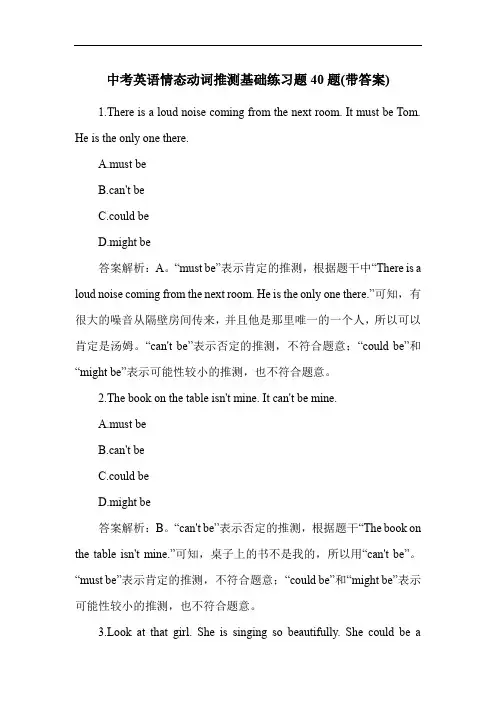
中考英语情态动词推测基础练习题40题(带答案)1.There is a loud noise coming from the next room. It must be Tom. He is the only one there.A.must beB.can't beC.could beD.might be答案解析:A。
“must be”表示肯定的推测,根据题干中“There is a loud noise coming from the next room. He is the only one there.”可知,有很大的噪音从隔壁房间传来,并且他是那里唯一的一个人,所以可以肯定是汤姆。
“can't be”表示否定的推测,不符合题意;“could be”和“might be”表示可能性较小的推测,也不符合题意。
2.The book on the table isn't mine. It can't be mine.A.must beB.can't beC.could beD.might be答案解析:B。
“can't be”表示否定的推测,根据题干“The book on the table isn't mine.”可知,桌子上的书不是我的,所以用“can't be”。
“must be”表示肯定的推测,不符合题意;“could be”和“might be”表示可能性较小的推测,也不符合题意。
3.Look at that girl. She is singing so beautifully. She could be aprofessional singer.A.must beB.can't beC.could beD.might be答案解析:C。
“could be”表示可能性较大的推测,根据题干“Look at that girl. She is singing so beautifully.”可知,那个女孩唱歌很好听,有可能是专业歌手。
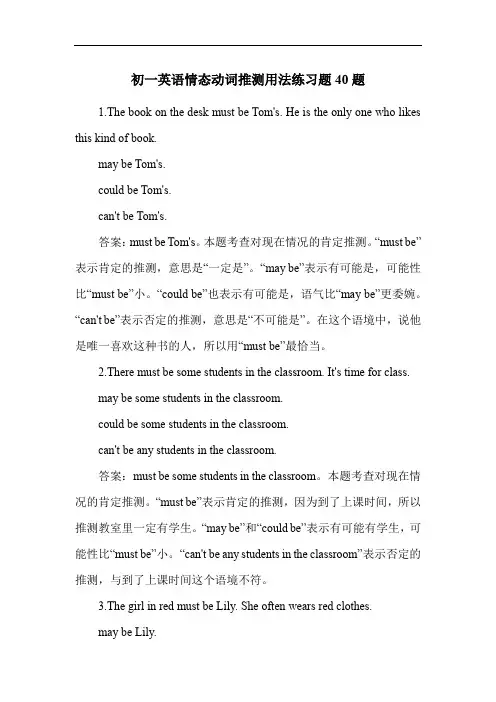
初一英语情态动词推测用法练习题40题1.The book on the desk must be Tom's. He is the only one who likes this kind of book.may be Tom's.could be Tom's.can't be Tom's.答案:must be Tom's。
本题考查对现在情况的肯定推测。
“must be”表示肯定的推测,意思是“一定是”。
“may be”表示有可能是,可能性比“must be”小。
“could be”也表示有可能是,语气比“may be”更委婉。
“can't be”表示否定的推测,意思是“不可能是”。
在这个语境中,说他是唯一喜欢这种书的人,所以用“must be”最恰当。
2.There must be some students in the classroom. It's time for class.may be some students in the classroom.could be some students in the classroom.can't be any students in the classroom.答案:must be some students in the classroom。
本题考查对现在情况的肯定推测。
“must be”表示肯定的推测,因为到了上课时间,所以推测教室里一定有学生。
“may be”和“could be”表示有可能有学生,可能性比“must be”小。
“can't be any students in the classroom”表示否定的推测,与到了上课时间这个语境不符。
3.The girl in red must be Lily. She often wears red clothes.may be Lily.could be Lily.can't be Lily.答案:must be Lily。
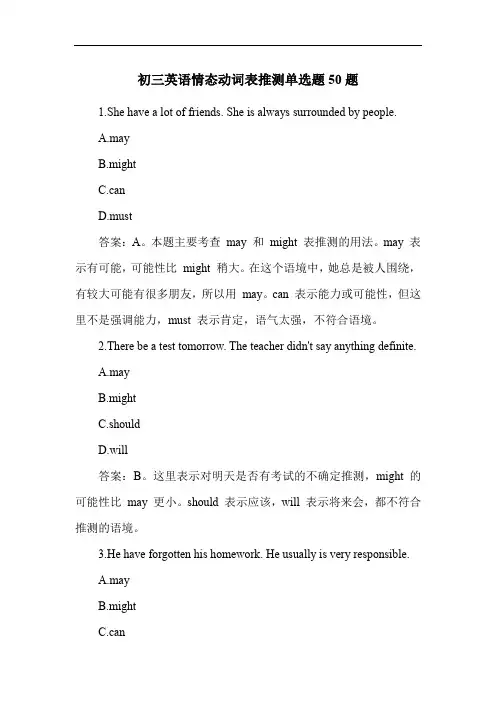
初三英语情态动词表推测单选题50题1.She have a lot of friends. She is always surrounded by people.A.mayB.mightC.canD.must答案:A。
本题主要考查may 和might 表推测的用法。
may 表示有可能,可能性比might 稍大。
在这个语境中,她总是被人围绕,有较大可能有很多朋友,所以用may。
can 表示能力或可能性,但这里不是强调能力,must 表示肯定,语气太强,不符合语境。
2.There be a test tomorrow. The teacher didn't say anything definite.A.mayB.mightC.shouldD.will答案:B。
这里表示对明天是否有考试的不确定推测,might 的可能性比may 更小。
should 表示应该,will 表示将来会,都不符合推测的语境。
3.He have forgotten his homework. He usually is very responsible.A.mayB.mightC.can答案:A。
根据后面说他通常很负责,所以这里是有一定可能性忘记了作业,用may。
might 可能性更小,can 表示能力或可能性,但这里不是强调能力,must 表示肯定,不符合语境。
4.There be some books on the shelf. I'm not sure.A.mayB.mightC.canD.must答案:A。
这里是对书架上是否有书的不确定推测,may 的可能性比might 稍大。
can 表示能力或可能性,但这里不是强调能力,must 表示肯定,不符合语境。
5.She have gone to the library. I saw her with a book earlier.A.mayB.mightC.canD.must答案:A。
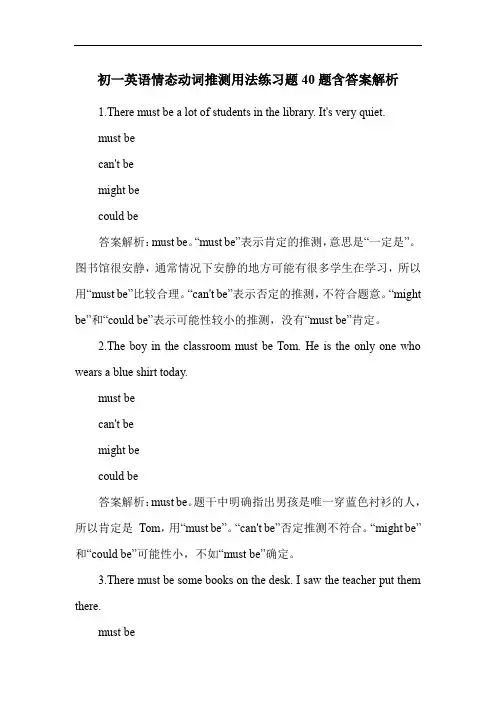
初一英语情态动词推测用法练习题40题含答案解析1.There must be a lot of students in the library. It's very quiet.must becan't bemight becould be答案解析:must be。
“must be”表示肯定的推测,意思是“一定是”。
图书馆很安静,通常情况下安静的地方可能有很多学生在学习,所以用“must be”比较合理。
“can't be”表示否定的推测,不符合题意。
“might be”和“could be”表示可能性较小的推测,没有“must be”肯定。
2.The boy in the classroom must be Tom. He is the only one who wears a blue shirt today.must becan't bemight becould be答案解析:must be。
题干中明确指出男孩是唯一穿蓝色衬衫的人,所以肯定是Tom,用“must be”。
“can't be”否定推测不符合。
“might be”和“could be”可能性小,不如“must be”确定。
3.There must be some books on the desk. I saw the teacher put them there.must becan't bemight becould be答案解析:must be。
看到老师把书放在桌子上了,所以肯定有书在桌子上,用“must be”。
“can't be”不对。
“might be”和“could be”表示不确定,这里已经确定看到老师放书了。
4.The girl who is singing must be Lily. She has a beautiful voice.must becan't bemight becould be答案解析:must be。
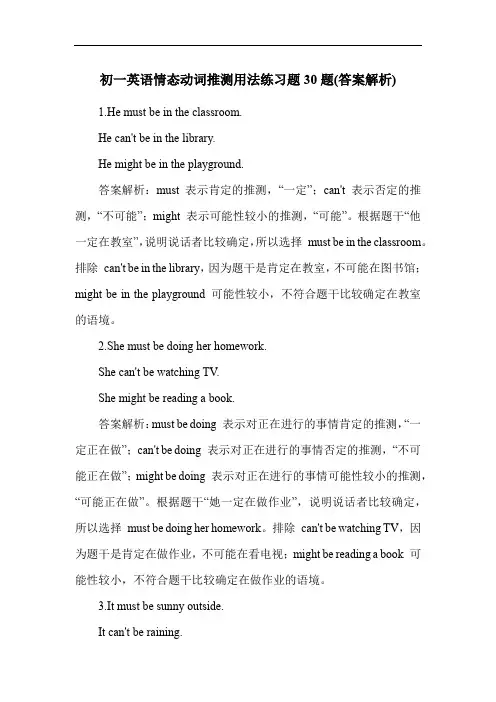
初一英语情态动词推测用法练习题30题(答案解析)1.He must be in the classroom.He can't be in the library.He might be in the playground.答案解析:must 表示肯定的推测,“一定”;can't 表示否定的推测,“不可能”;might 表示可能性较小的推测,“可能”。
根据题干“他一定在教室”,说明说话者比较确定,所以选择must be in the classroom。
排除can't be in the library,因为题干是肯定在教室,不可能在图书馆;might be in the playground 可能性较小,不符合题干比较确定在教室的语境。
2.She must be doing her homework.She can't be watching TV.She might be reading a book.答案解析:must be doing 表示对正在进行的事情肯定的推测,“一定正在做”;can't be doing 表示对正在进行的事情否定的推测,“不可能正在做”;might be doing 表示对正在进行的事情可能性较小的推测,“可能正在做”。
根据题干“她一定在做作业”,说明说话者比较确定,所以选择must be doing her homework。
排除can't be watching TV,因为题干是肯定在做作业,不可能在看电视;might be reading a book 可能性较小,不符合题干比较确定在做作业的语境。
3.It must be sunny outside.It can't be raining.It might be cloudy.答案解析:must be 表示肯定的推测,“一定”;can't be 表示否定的推测,“不可能”;might be 表示可能性较小的推测,“可能”。
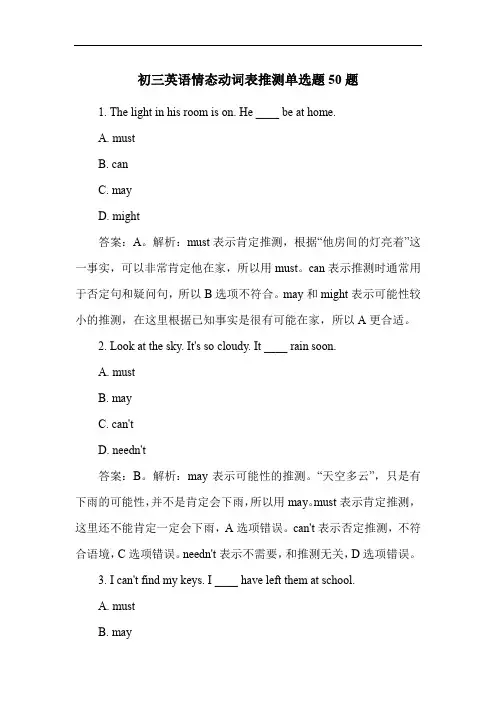
初三英语情态动词表推测单选题50题1. The light in his room is on. He ____ be at home.A. mustB. canC. mayD. might答案:A。
解析:must表示肯定推测,根据“他房间的灯亮着”这一事实,可以非常肯定他在家,所以用must。
can表示推测时通常用于否定句和疑问句,所以B选项不符合。
may和might表示可能性较小的推测,在这里根据已知事实是很有可能在家,所以A更合适。
2. Look at the sky. It's so cloudy. It ____ rain soon.A. mustB. mayC. can'tD. needn't答案:B。
解析:may表示可能性的推测。
“天空多云”,只是有下雨的可能性,并不是肯定会下雨,所以用may。
must表示肯定推测,这里还不能肯定一定会下雨,A选项错误。
can't表示否定推测,不符合语境,C选项错误。
needn't表示不需要,和推测无关,D选项错误。
3. I can't find my keys. I ____ have left them at school.A. mustB. mayC. canD. should答案:B。
解析:may表示不太确定的推测。
“我找不到钥匙了”,只是推测可能把钥匙落在学校了,不是肯定的结论,所以用may。
must 表示肯定推测,这里没有足够证据肯定钥匙就在学校,A选项错误。
can表示推测常用于否定句和疑问句,C选项错误。
should表示应该,和推测无关,D选项错误。
4. She ____ be in the library because I just saw her in the park.A. can'tB. mustn'tC. needn'tD. shouldn't答案:A。
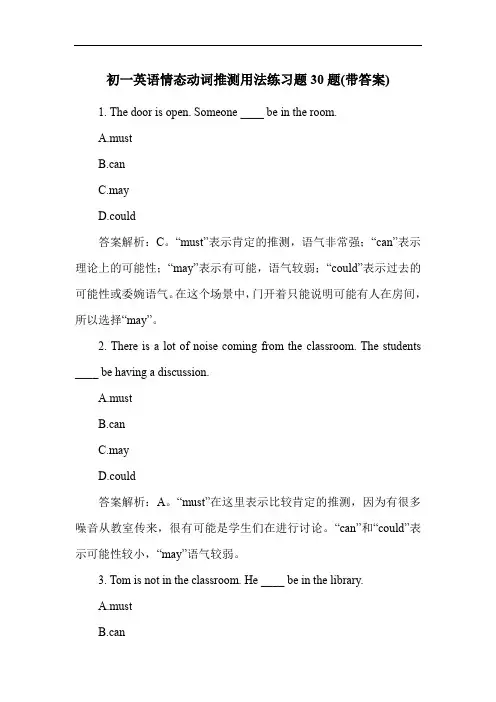
初一英语情态动词推测用法练习题30题(带答案)1. The door is open. Someone ____ be in the room.A.mustB.canC.mayD.could答案解析:C。
“must”表示肯定的推测,语气非常强;“can”表示理论上的可能性;“may”表示有可能,语气较弱;“could”表示过去的可能性或委婉语气。
在这个场景中,门开着只能说明可能有人在房间,所以选择“may”。
2. There is a lot of noise coming from the classroom. The students ____ be having a discussion.A.mustB.canC.mayD.could答案解析:A。
“must”在这里表示比较肯定的推测,因为有很多噪音从教室传来,很有可能是学生们在进行讨论。
“can”和“could”表示可能性较小,“may”语气较弱。
3. Tom is not in the classroom. He ____ be in the library.A.mustB.canD.could答案解析:C。
“may”表示有可能,因为汤姆不在教室,只是有可能在图书馆,不能确定,所以选择“may”。
“must”语气太强,“can”和“could”也不太符合这个场景。
4. The light in the office is on. Someone ____ be working there.A.mustB.canC.mayD.could答案解析:C。
灯亮着只能说明有可能有人在办公室工作,“may”语气较弱,符合这个场景。
“must”太肯定,“can”和“could”也不太恰当。
5. There are some footprints on the ground. Someone ____ have walked here.A.mustB.canC.mayD.could答案解析:C。
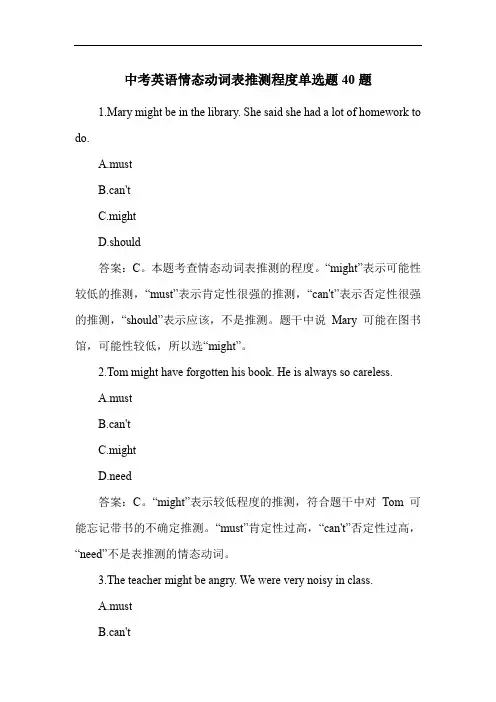
中考英语情态动词表推测程度单选题40题1.Mary might be in the library. She said she had a lot of homework to do.A.mustB.can'tC.mightD.should答案:C。
本题考查情态动词表推测的程度。
“might”表示可能性较低的推测,“must”表示肯定性很强的推测,“can't”表示否定性很强的推测,“should”表示应该,不是推测。
题干中说Mary 可能在图书馆,可能性较低,所以选“might”。
2.Tom might have forgotten his book. He is always so careless.A.mustB.can'tC.mightD.need答案:C。
“might”表示较低程度的推测,符合题干中对Tom 可能忘记带书的不确定推测。
“must”肯定性过高,“can't”否定性过高,“need”不是表推测的情态动词。
3.The teacher might be angry. We were very noisy in class.A.mustB.can'tD.ought to答案:C。
“might”在这里表示对老师可能生气的较低程度推测。
“must”太肯定,“can't”太否定,“ought to”不是表推测的情态动词。
4.She might come to the party later. She wasn't sure.A.mustB.can'tC.mightD.would答案:C。
“might”符合题干中她可能晚些来派对的不确定情况。
“must”肯定性强,“can't”否定性强,“would”不是表推测的情态动词。
5.There might be some mistakes in my homework. I didn't check it carefully.A.mustB.can'tC.mightD.should答案:C。
中考英语情态动词推测基础运用练习题30题1.He is always reading in the library. He ____ be very hardworking.A.mustB.canC.couldD.may答案:A。
“must”在这里表示肯定的推测,因为他总是在图书馆读书,所以可以确定他一定很勤奋。
“can”表示有能力做某事或者理论上的可能性;“could”表示过去的能力或者委婉的可能性;“may”表示不太确定的可能性。
2.There is a lot of noise coming from her room. She ____ be having a party.A.mustB.canC.couldD.may答案:D。
这里只是听到很多噪音从她房间传来,不确定一定是在开派对,所以“may”表示不太确定的可能性更合适。
“must”表示非常肯定的推测,这里证据不足;“can”表示有能力做某事或者理论上的可能性;“could”表示过去的能力或者委婉的可能性。
3.The boy is very good at math. He ____ solve difficult math problems easily.A.mustB.canC.couldD.may答案:B。
“can”表示有能力做某事,这里说男孩擅长数学,所以有能力轻易解决难题。
“must”表示肯定的推测,这里不是推测而是强调能力;“could”表示过去的能力或者委婉的可能性;“may”表示不太确定的可能性。
4.I haven't seen her for a long time. She ____ be very busy these days.A.mustB.canC.couldD.may答案:D。
“may”表示不太确定的推测,因为很久没见,所以不太确定她一定很忙,只是有这种可能。
“must”表示非常肯定的推测,这里证据不足;“can”表示有能力做某事或者理论上的可能性;“could”表示过去的能力或者委婉的可能性。
初一英语情态动词推测用法练习题30题带答案解析1.The boy in the park be Tom. He likes to play there.A.mustB.can'tC.might答案解析:A。
“must”表示肯定的推测,可能性很大。
“can't”表示否定的推测,“might”表示可能性较小的推测。
根据后面“He likes to play there.”可知在公园的男孩很可能是Tom,所以选A。
2.She have a lot of friends. She is always surrounded by people.A.mustB.can'tC.might答案解析:A。
“must”在这里表示比较肯定的推测,因为“她总是被人围绕着”,所以很可能有很多朋友。
“can't”不符合语境,“might”可能性较小,不如“must”合适。
3.The book on the table be his. He was reading it yesterday.A.mustB.can'tC.might答案解析:A。
“must”表示有较大把握的推测,因为“他昨天在看这本书”,所以这本书很可能是他的。
“can't”否定推测不合理,“might”可能性较小,不如“must”准确。
4.He be very tired. He has been working all day.A.mustB.can'tC.might答案解析:A。
“must”在这里表示肯定的推测,由于“他一整天都在工作”,所以肯定很累。
“can't”与语境不符,“might”可能性较小,没有“must”准确。
5.The phone be hers. She has a similar one.A.mustB.can'tC.might答案解析:C。
“might”表示可能性较小的推测,仅仅因为有相似的手机不能肯定就是她的,所以用“might”。
中考英语情态动词推测基础练习题40题1.There is a loud noise coming from the classroom. It may/might/could be the students having a discussion.maymightcould答案解析:三个选项都可以表示可能性,may 的可能性相对较大,might 次之,could 再次之。
这里题干只是说有很大的噪音从教室传来,不确定具体情况,所以三个选项都有可能,但可能性都不是很大,因此三个选项在这个语境中都可以。
2.The book on the table may/might/could belong to Tom.maymightcould答案解析:may 的可能性相对较大,might 次之,could 再次之。
桌子上的书不确定是谁的,只是猜测可能属于汤姆,三个选项都有一定可能性,但都不确定,所以三个选项在这个语境中都可以。
3.There is someone at the door. It may/might/could be the postman.maymightcould答案解析:may 的可能性相对较大,might 次之,could 再次之。
有人在门口,不确定是谁,只是猜测可能是邮递员,三个选项都有一定可能性,但都不确定,所以三个选项在这个语境中都可以。
4.The light in the room is on. Someone may/might/could be in there.maymightcould答案解析:may 的可能性相对较大,might 次之,could 再次之。
房间灯亮着,不确定是否有人在里面,只是猜测,三个选项都有一定可能性,但都不确定,所以三个选项在这个语境中都可以。
5.I saw a figure in the distance. It may/might/could be a person.maymightcould答案解析:may 的可能性相对较大,might 次之,could 再次之。
初一英语情态动词推测用法练习题40题1.There is a lot of noise coming from the classroom. Some students ____ be having a discussion.A.mustB.canC.mayD.could答案解析:C。
“must”表示肯定的推测,语气最强;“can”表示可能性,但在这种情况下通常不太符合语境;“may”表示有可能,语气比较委婉,符合有很多噪音可能是学生在讨论的情况;“could”也表示可能性,但比“may”更委婉,这里不太合适。
2.The teacher is not in the office. She ____ be in the classroom.A.mustB.canC.mayD.could答案解析:C。
“must”语气太肯定,没有足够依据;“can”表示能够,在这里不合适;“may”表示有可能,比较符合老师不在办公室可能在教室的情况;“could”比“may”更委婉,这里不太恰当。
3.There are some books on the desk. They ____ belong to Tom.A.mustB.canC.mayD.could答案解析:C。
“must”太肯定;“can”表示能力或可能性,这里不太合适;“may”表示有可能,有一些书在桌上,有可能是汤姆的;“could”更委婉,不太符合这里的语境。
4.The boy is reading a book in the library. He ____ be preparing for an exam.A.mustB.canC.mayD.could答案解析:C。
“must”语气太强硬;“can”表示能力或可能性,不太符合;“may”表示有可能,男孩在图书馆看书有可能是在准备考试;“could”更委婉,这里不太合适。
5.The girl is smiling. She ____ be very happy.A.mustB.canC.mayD.could答案解析:C。
中考英语情态动词推测基础运用练习题30题(答案解析)1. Look at the man over there. He ____ be a teacher. He is so patient with those children.A. mustB. mayC. can'tD. might答案解析:A。
must表示非常肯定的推测,根据句子中“He is so patient with those children”可以看出他对孩子们很有耐心,所以非常有可能是一名老师,这里用must很合适。
may和might表示可能性比较小的推测,can't表示否定推测,不符合语境。
2. The light in the room is on. There ____ someone in it.A. mustB. canC. mayD. should答案解析:A。
房间灯亮着,根据这个情况非常肯定房间里有人,must用于肯定句中表示很有把握的推测。
can表示能力或请求许可等,与推测关系不大;may表示可能,把握性没有must强;should表示应该,不用于推测。
3. Listen! The music coming from the hall. It ____ be a concert.A. mustB. mightC. can'tD. may答案解析:A。
听,有音乐从大厅传来,根据这个情况可以很肯定地推测出这里正在举办一场音乐会,must表示肯定的推测。
might 和may表示可能性较小的推测,can't表示否定推测,不符合语境。
4. She has a very expensive car. She ____ be very rich.A. mustB. canC. mayD. might答案解析:A。
她有一辆非常昂贵的汽车,从这一点可以很有把握地推测出她很富有,must用于这种比较肯定的推测。
中考英语情态动词推测基础运用练习题30题含答案解析1.There must be someone in the classroom. The light is on.A.canB.mustC.mightD.could答案解析:B。
“must”在这里表示肯定的推测,语气最强,因为灯亮着,所以很肯定教室里有人。
“might”和“could”表示可能性较小的推测,“can”一般表示能力或可能性,在这里不太符合语境。
2.She can't be at home. She has gone to school.A.mustB.can'tC.mayD.could答案解析:B。
根据后一句“她去学校了”可知她肯定不在家,“can't”表示否定的推测,语气较强。
“must”表示肯定推测,这里不合适;“may”和“could”表示可能性较小的推测,也不符合。
3.The boy in blue look very tired. He must have stayed up late last night.A.mustB.can'tC.may答案解析:A。
“must”在这里表示肯定的推测,语气较强,因为男孩看起来很累,所以推测他昨晚肯定熬夜了。
“can't”表示否定推测,不符合;“may”和“could”可能性较小,没有“must”符合语境。
4.There may be some books on the desk.A.mustB.mayC.can'tD.could答案解析:B。
“may”表示可能性的推测,语气较弱。
“must”表示肯定推测,这里不确定书一定在桌子上;“can't”表示否定推测;“could”也表示可能性较小,但没有“may”正式。
5.He might be at the library.A.mustB.can'tC.mayD.might答案解析:D。
情态动词表推测练习题1.— Where are you going this month?— We______ go to Xiamen, but we're not sure.A. needn’tB. mustC. mightD. mustn't2. — Excuse me, whose book is this?—It ________ be John’s. It has his name on it.A. mustB. needC. can’t3.. The man ______be my English teacher. He has gone to Canada.A. mightB. mustC. can’t4.—Are you in a hurry?—NO, I’ve got plenty of time I ______wait.A. canB. can’tC. mustD. mustn’t5.— Have you decided where to go for your summer vacation?—Not yet. We _______go to Qingdao . It's a good place for vacation.A. mayB. needC. must6.You mustn’t go off on your own, because you _______get lost in the mountains.A. shouldB. mustC. needD. might7----Oh, it's raining hard.----Be careful! The road _______be wet.A. couldB. mustC. might8.— Whose T-shirt is this?—It ________ be John’s. It’s ________ small for him.A. can’t; much tooB. can’t; too muchC. mustn’t; too m uch9.—Who’s the man over there? Is it Mr. Black?—It ______ be him. He’s much taller.A. may notB. can’tC. will notD. mustn’t10The woman who is talking with Mr. Brown ______ be Miss Li. She has gone to England. A. can’t B. must C. may D. mustn’t11— Look at the boy playing basketball on the ground. Is it George?—It ______ be him. He told me he would play basketball after class, but he’s not sure.A. mustn’tB. mustC. can’tD. may12.—Difficulties always go with me!—Cheer up! If God closes a door in front of you, there ______ be a window opened for you.A. wouldB. must D. could D. can13.—Look at the young lady in red. Is it Mrs. King?—No. It _____ be her. She is wearing a white dress today.A. canB. mayC. mustD. can’t14.—Two hundred years for such a T-shirt! You _____________ be joking!—I’m not joking. It’s made of silk.A. can’tB. canC. needD. must15.That T-shirt _______ be expensive because it’s by a famous designer.A. can’tB. mustn’tC. mustD. should16.—Someone is knocking at the door. Is it Ann?—It ______be her. She is giving a performance at the theater now.A. mayB. mustC. can’tD. mustn’t17.—Is that girl Susan?— It _________ be her. She left for Beijing yesterday.needn't B. can't C. mustn't18.—Do you have any plans for this weekend?—I'm not sure. I ______ go climbing Mount Yuntai.A. mustB. needC. mayD. can19.“Whose notebook is this?” “It _______ Jim’s. It has his name on it.”A. can’t beB. must beC. can be20—Is that your teacher?—That _____be Mr.Wang. He has gone to Japan with his wife.A.can’tB. mustn’tC. may not21.—Who is that?—It _____ be Shirly. Only she is in red today .A. couldB. mayC. must22.—Is that girl under the tree Mary?—No, that ______be Mary. She is in New York.A. canB. mustn’tC.can’t23.Is Maria knocking at the door?It ______be her. She is in Australia now.A. may notB. needn'tC. mustn'tD. can't24.-You _____ be happy with the strong public support you’ve received.-Yes, you’re right. I’m really excited.A. mayB. canC. mustD. need25. —My brother won the first prize in speech competition.—Congratulations! You ______be excited about that.A. needB. mustC. wouldD. can26.That man ______ be my English teacher. He has gone to Canada.A. needn’tB. mustn’tC. can’t27.—Meng Fei had his arm broken while recording If You Are the One in Beijing.—Really? Then perhaps he _____host TV programs for some time.A. needn’tB. mustn’tC. shouldn’tD.can’t28.----Have you decided which senior high school to choose?-----Not yet. I ______ go to Moonlight School.A. mustB. mayC. needD. should29.The lady in this photo ______be over fifty! She looks so young!A. mustn’tB. mustC. can’tD. can30.—You ______be excited that you’re going back to your hometown soon.—Yes, I can’t wait any longer.A. shallB. canC. needD. must31— Excuse me, when are we going to have a picnic?—I’m not sure, Ask our monitor, please. He ______ know.A. needB. canC. mayD. shall32—Whose is the pencil box?—It______ be Tom's. Look at his name on the cover!A. canB. mayC. mustD. need33This toy Mickey Mouse _______be Amy's. she’s the only kid at the picnic.A. mustB. canC. needD. can't34—Look! The man at the gate ______ be our teacher. He is always standing there every morning.—No, it _______ be him. He is having a meeting in the office now.A.must; can’tB. must; mustn’tC. can’t; can’t1。